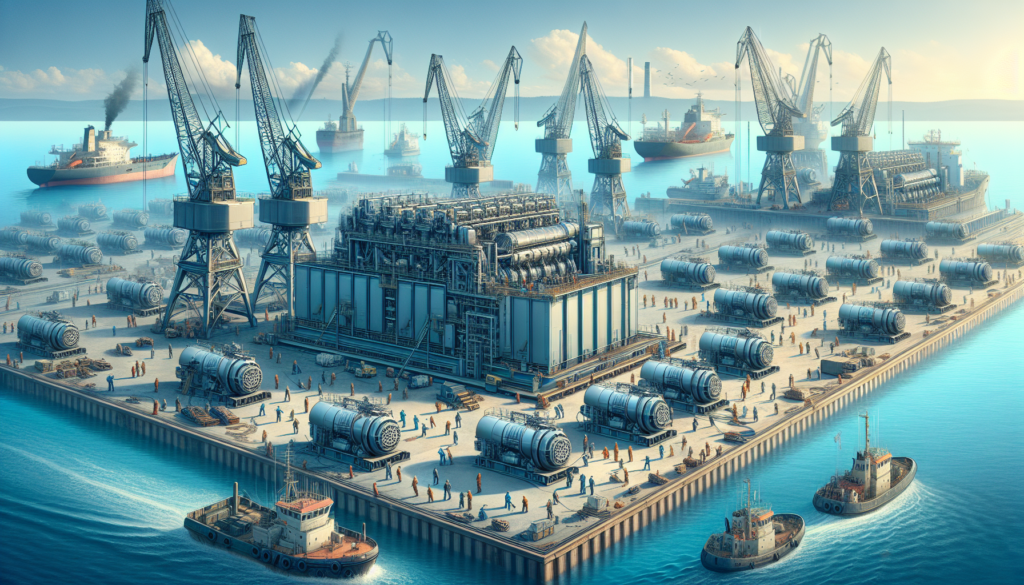Exploring the Depths of Marine Generators: Powering the Seas
When we think of generators, our minds often drift to backup power during outages or portable solutions for camping trips. However, there is a whole other realm where generators play a crucial role – the marine industry. Marine generators are the unsung heroes of vessels, providing essential power for various systems and appliances while navigating the vast oceans. From luxury yachts to commercial ships, these marine generators are the heartbeat of maritime operations, ensuring smooth sailing in the most challenging conditions.
In this comprehensive guide, we will dive deep into the world of marine generators, exploring their functions, types, applications, and the latest advancements in the field. Join us as we unravel the mysteries of these powerful machines and discover the critical role they play in the marine industry.
The Evolution of Marine Generators
Marine generators have come a long way since their inception, evolving to meet the increasing demands of modern vessels. Historically, ships relied on manual labor and wind power for propulsion, with limited electrical systems onboard. However, as technology advanced, the need for reliable power generation became paramount, leading to the development of marine generators.
Early marine generators were typically diesel-powered, providing the necessary electricity for lighting, communication systems, navigation equipment, and other essential components onboard. Over time, these generators became more compact, efficient, and reliable, offering higher power output in a smaller footprint. Today, marine generators come in various configurations, including diesel, gas, and hybrid models, tailored to meet the specific needs of different types of vessels.
The Role of Marine Generators
Marine generators serve as the primary source of electrical power onboard ships, providing energy for propulsion, lighting, climate control, communication systems, navigation equipment, refrigeration, and other essential functions. Without these generators, vessels would be stranded at sea, unable to operate critical systems or maintain a comfortable environment for passengers and crew.
Moreover, marine generators play a crucial role in ensuring safety at sea, powering essential equipment such as radar, GPS, sonar, and emergency lighting. In emergencies, when the main engines fail, marine generators act as a backup power source, allowing vessels to maintain essential operations until repairs can be made.
Types of Marine Generators
Marine generators come in various types and configurations, each designed to meet specific requirements based on the size and purpose of the vessel. The most common types of marine generators include:
Diesel Generators
Diesel generators are the traditional choice for marine applications, known for their reliability, durability, and fuel efficiency. These generators use diesel fuel to power an internal combustion engine, which drives an alternator to produce electricity. Diesel generators are preferred for their high power output, low maintenance requirements, and long service life, making them ideal for commercial vessels and large yachts.

Gas Generators
Gas generators are another popular choice for marine applications, offering cleaner emissions and quieter operation compared to diesel generators. These generators use natural gas or propane as fuel, which is more environmentally friendly and cost-effective. Gas generators are commonly used in smaller vessels, such as pleasure boats and sailing yachts, where space and weight considerations are essential.

Hybrid Generators
Hybrid generators combine the benefits of diesel and electric power to offer a more flexible and efficient solution for marine applications. These generators can operate on diesel fuel, electric power, or a combination of both, depending on the vessel’s power requirements and operational needs. Hybrid generators are gaining popularity in the marine industry due to their ability to reduce fuel consumption, emissions, and noise levels, making them an environmentally sustainable choice for modern vessels.

Applications of Marine Generators
Marine generators find a wide range of applications across different types of vessels, from small pleasure boats to large commercial ships. Some common applications of marine generators include:
Propulsion
Many ships rely on marine generators to power electric propulsion systems, driving the vessel forward through the water. Electric propulsion offers several advantages, including improved efficiency, reduced emissions, and better maneuverability, making it an attractive option for modern vessels seeking to minimize their environmental impact.
Onboard Systems
Marine generators provide electricity for various onboard systems, including lighting, climate control, refrigeration, communication systems, navigation equipment, and entertainment systems. These generators ensure a comfortable and safe environment for passengers and crew, allowing vessels to operate smoothly even in remote or challenging conditions.
Emergency Power
Marine generators serve as a reliable source of emergency power onboard ships, ensuring continuity of essential operations in case of main engine failure or power outages. These generators are equipped with automatic start systems, which activate when the main power source fails, providing critical electricity to keep the vessel operational until normal power is restored.
Latest Advancements in Marine Generators
The marine industry is constantly evolving, with new technologies and innovations driving the development of more efficient and sustainable marine generators. Some of the latest advancements in marine generators include:
Fuel Efficiency
Manufacturers are focusing on improving the fuel efficiency of marine generators, using advanced combustion technologies, electronic controls, and hybrid configurations to reduce fuel consumption and emissions. By optimizing fuel efficiency, marine generators can operate more sustainably and cost-effectively, benefiting both the environment and vessel operators.
Smart Controls
Smart controls and monitoring systems are becoming standard features in modern marine generators, allowing operators to monitor performance, diagnose issues, and optimize operation remotely. These systems use sensors, data analytics, and connectivity technologies to provide real-time insights into generator performance, enabling proactive maintenance and reducing downtime.
Environmental Sustainability
Environmental sustainability is a key focus in the marine industry, driving the development of eco-friendly marine generators that comply with strict emissions regulations and green initiatives. Manufacturers are investing in cleaner fuel technologies, exhaust treatment systems, and noise reduction measures to minimize the environmental impact of marine generators and promote a greener future for the maritime sector.
Expert Opinions
According to marine industry experts, the future of marine generators lies in hybrid and electric propulsion systems, as vessels seek to reduce their carbon footprint and transition to cleaner energy sources. Hybrid generators, with their ability to switch between diesel and electric power, offer a flexible and sustainable solution for modern vessels, balancing performance with environmental responsibility.
Common Misconceptions
One common misconception about marine generators is that they are only used for backup power in emergencies. In reality, marine generators play a much broader role in powering essential systems onboard ships, supporting propulsion, communication, navigation, and comfort functions throughout the vessel’s operation.
Conclusion
To wrap things up, marine generators are the unsung heroes of the seas, providing essential power for vessels of all sizes and types. From diesel to gas to hybrid models, these generators are the lifeline of maritime operations, ensuring safety, comfort, and efficiency onboard ships around the world. As technology advances and environmental concerns grow, the future of marine generators looks bright, with a focus on fuel efficiency, smart controls, and environmental sustainability shaping the next generation of these critical marine systems.
Whether you’re cruising on a luxury yacht or navigating the high seas on a commercial ship, marine generators are the silent workhorses that keep the maritime industry moving forward. So next time you set sail, take a moment to appreciate the power behind the scenes the marine generators that power the seas.



